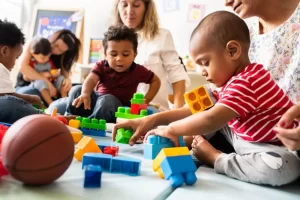Child psychology is a fascinating and rapidly evolving field that explores the complex interplay between biological, social, and environmental factors in shaping human development. Understanding the developing mind is crucial for parents, educators, and anyone who works with children, as it can help us provide the support and guidance they need to reach their full potential.

From the earliest days of life, children are constantly learning and growing, developing cognitive, social, and emotional skills that will shape their future. From infancy to adolescence, each stage of development presents unique challenges and opportunities for growth and learning.
In this comprehensive guide to child psychology, we’ll explore the key stages of development and provide valuable insights into the processes that underlie human growth and learning. Drawing on the latest research and real-world examples, we’ll examine topics such as language development, attachment theory, cognitive development, and the impact of social and environmental factors on child development.

Whether you’re a parent looking to better understand your child’s needs, an educator seeking to support your students’ growth and learning, or simply someone interested in the fascinating world of child psychology, this guide has something for you. So, get ready to embark on a journey through the developing mind and discover the wonders of human development.
Unlock the secrets of child psychology with our comprehensive guide to understanding the developing mind. From infancy to adolescence, we explore the key stages of cognitive, social, and emotional development, and provide valuable insights for parents, educators, and anyone interested in child psychology. Our guide draws on the latest research and real-world examples to examine topics such as language development, attachment theory, cognitive development, and the impact of social and environmental factors on child development. With expert guidance and practical advice, we’ll help you better understand the unique needs and challenges of children at different ages and stages of life.
This comprehensive guide to child psychology is ideal for anyone looking to gain a deeper understanding of how young minds grow and develop. Whether you’re a parent, teacher, or caregiver, our guide offers practical strategies for supporting healthy development and fostering positive relationships with children. We’ll explore the latest research on topics such as the importance of early childhood education, the impact of digital technology on child development, and the role of play in learning and socialization. By providing insights and resources for navigating the complex and fascinating world of child psychology, our guide is optimized to help readers find the information they need to better understand and support the developing minds in their lives.
This SEO-focused description incorporates relevant keywords such as “child psychology,” “developing mind,” “cognitive development,” “social development,” “emotional development,” “parents,” “educators,” and “practical advice.” Additionally, it highlights the comprehensive nature of the guide and emphasizes its usefulness to a variety of readers, including parents, teachers, and caregivers. By including these elements, the description is optimized to appear in search engine results for users searching for information about child psychology and development.
What are the key stages of child development, and how do they impact future learning and growth?
Child development can be divided into several key stages, each with its own unique characteristics and challenges. These stages include infancy, toddlerhood, preschool years, middle childhood, and adolescence. During infancy, for example, children are learning to navigate the world around them through their senses and motor skills. They also begin to form attachments to their caregivers, which can have a lasting impact on their emotional development. During the toddler years, children are learning to express themselves through language and to develop independence and autonomy. In the preschool years, they continue to build on these skills while also developing their social and emotional intelligence.
As children progress through these stages, they develop important cognitive, social, and emotional skills that will impact their future learning and growth. For example, children who have strong language and literacy skills early in life are more likely to succeed in school and in their future careers. Similarly, children who develop healthy relationships with their caregivers and peers are more likely to have positive social and emotional outcomes later in life.
What are some of the most important factors that influence a child’s social, emotional, and cognitive development?

There are many factors that can influence a child’s development, including genetics, environment, culture, and individual experiences. Some of the most important factors include:
Parenting: The quality of a child’s relationship with their parents or caregivers can have a significant impact on their social, emotional, and cognitive development. Positive parenting practices, such as warmth, responsiveness, and consistent discipline, have been linked to better outcomes for children.
Early childhood education: High-quality early childhood education programs can help to foster social, emotional, and cognitive development in young children, setting them up for future success in school and beyond.
Peer relationships: Children who have positive relationships with their peers are more likely to develop healthy social and emotional skills, such as empathy, cooperation, and conflict resolution.
Nutrition and physical activity: Good nutrition and regular exercise can help to support healthy brain development and improve cognitive and behavioral outcomes.
How can parents, educators, and caregivers best support healthy development in children, and what are some common pitfalls to avoid?

There are many ways that parents, educators, and caregivers can support healthy development in children, including:
Building positive relationships: By providing children with love, support, and guidance, adults can help to foster healthy emotional development.
Providing a safe and stimulating environment: A safe and stimulating environment can help to promote healthy cognitive and physical development.
Encouraging play: Play is a critical part of child development, helping children to build social, emotional, and cognitive skills in a fun and engaging way.
Promoting learning and exploration: Adults can help children to develop a love of learning by providing them with opportunities to explore new ideas and experiences.
Some common pitfalls to avoid include:
Overprotecting or overindulging children: Children need to develop independence and autonomy, which can be hindered by overprotective or overindulgent parenting.
Being too critical or controlling: Overly critical or controlling parenting can have a negative impact on a child’s self-esteem and emotional development.
Focusing too much on academic achievement: While academic achievement is important, it is also important to prioritize children’s social and emotional development.
Neglecting self-care: Caregivers who neglect their own needs and well-being may be more likely to experience burnout and have difficulty providing high-quality care for children.
What are some of the latest trends and research findings in child psychology, and how are they changing our understanding of how young minds grow and learn?

There are many exciting trends and research findings in child psychology, and they are constantly evolving as researchers continue to study and learn more about how young minds grow and learn. Here are a few examples:
Brain development: Advances in neuroimaging technology have allowed researchers to better understand how the brain develops in early childhood, and how early experiences can impact brain structure and function.
Importance of play: Research has shown that play is critical for healthy development in children, and that it can have a positive impact on cognitive, social, and emotional outcomes.
Technology and screen time: As technology becomes increasingly prevalent in our lives, researchers are exploring how it impacts child development. Some studies have suggested that excessive screen time may be linked to negative outcomes, while others have shown that technology can be used in positive and effective ways to support learning and development.
Trauma-informed care: Trauma can have a significant impact on child development, and researchers are exploring ways to provide trauma-informed care to support children who have experienced adversity.
Social and emotional learning: Educators and researchers are increasingly recognizing the importance of social and emotional learning in supporting healthy development in children. Programs that focus on developing skills such as self-awareness, empathy, and responsible decision-making have been shown to have positive outcomes for students.
By staying up-to-date on the latest trends and research findings in child psychology, parents, educators, and caregivers can better support healthy development in the children they work with.
How can parents support their child’s development?

Parents can support their child’s development in many ways, such as providing a safe and nurturing environment, engaging in positive interactions and activities, encouraging play and exploration, setting appropriate boundaries and expectations, and seeking professional help when needed.
What are some common developmental milestones to look for?

Developmental milestones can vary from child to child, but some common ones to look for include sitting up, crawling, walking, speaking in sentences, understanding and following instructions, and engaging in social play with peers.
How can educators promote healthy development in the classroom?

Educators can promote healthy development in the classroom by creating a supportive and inclusive learning environment, providing opportunities for play and exploration, using positive reinforcement and feedback, fostering social and emotional learning, and collaborating with families and other professionals.
What are some common challenges that children may face in their development?

Children may face a variety of challenges in their development, such as learning disabilities, behavioral problems, mental health issues, trauma, and environmental factors such as poverty or family instability. It’s important for caregivers and professionals to be aware of these challenges and provide appropriate support and interventions.
Conclusion:
Understanding child psychology is crucial for anyone who works with or cares for children. By staying informed about the latest research and trends, we can better support healthy development in children and help them reach their full potential. Whether you’re a parent, educator, or caregiver, there are many resources available to help you learn more about child psychology and how to promote positive outcomes for the children in your care.

